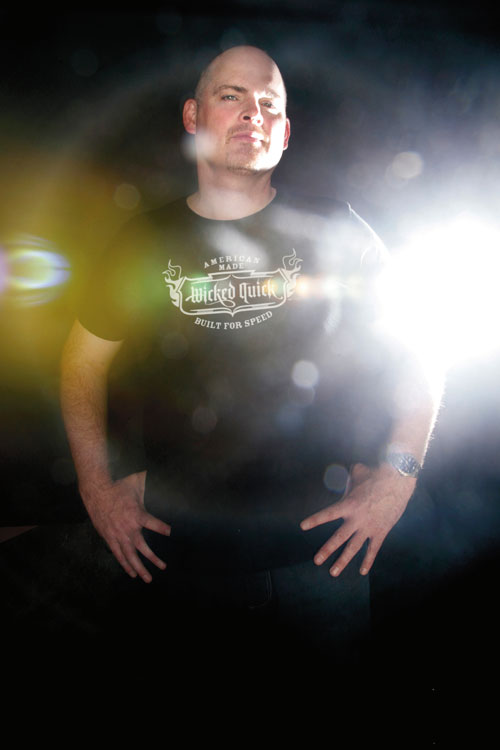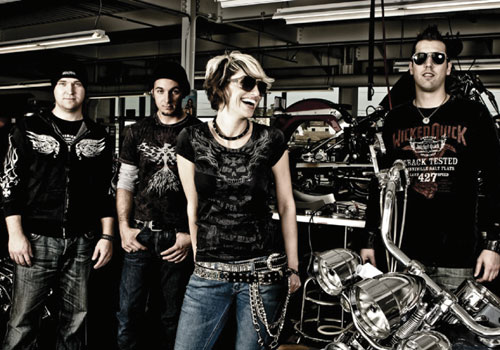 Wicked Quick makes buying a pricey T-shirt an act of rebellion and along the way becomes Oregon’s darling apparel startup.
Wicked Quick makes buying a pricey T-shirt an act of rebellion and along the way becomes Oregon’s darling apparel startup.
Wicked Quick makes buying a pricey T-shirt an act of rebellion and along the way becomes Oregon’s darling apparel startup.
BY ADRIANNE JEFFRIES
 |
Wicked Quick founder and CEO Tarran PitschkaPHOTO BY CHRISTINE TAYLOR |
Racing fans lucky enough to snag a special pass and crazy enough to waive liability in case an engine exploded stood on the track between dragsters on the starting line at a National Hot Rod Association race in Pomona in 2003. Everyone — the brave few on the track, the 80,000-strong in the stands — was on edge as the drivers crawled forward to take their marks. The light dropped from amber to green, fuel exploded into flames as the cars blasted off, the smell of nitromethane hit, and the crowd’s cheers tripped into screams, all in milliseconds.
Apparel industry veteran Tarran Pitschka was on the racetrack, being shoved backward by the force of two 7,000-horsepower engines, when he devised the idea for Wicked Quick.
“It was at that instant that I thought, if I was still at Nike or No Fear or worked for a cool brand like Diesel, what would I do with that experience as inspiration for a clothing line,” says Pitschka, 46, a soft-voiced Minnesotan and motorcycle enthusiast sans visible tattoos who moved to Portland 16 years ago.
Pitschka brainstormed brand names for six months. The company might have been Speed Nation, but friends and acquaintances preferred Wicked Quick, which Pitschka translates as “speed with attitude.” Six years and a recession later, Wicked Quick has caught fire. Through bootstrapping, attention to detail and careful branding, the five-person company is on track to gross more than $1 million in revenue this year, more than double its take in 2008.
Wicked Quick makes performance gear for the pro racing world but its staple is the humble T-shirt. Wicked Quick T-shirts are printed with intricate designs evocative of motorcycles, tattoos and rock ’n’ roll and priced mostly in the $35 to $75 range, considered the “value end” of “premium.” Celebrities such as actor John Cusack, NASCAR driver Joey Lagano and Eric Singer of KISS have picked up the shirts, which are sold at Nordstrom, Metropark, select Harley Davidson outlets and the Hard Rock Hotel in Las Vegas.
Pitschka plans to grow Wicked Quick into a $50 million brand. Its experienced management team includes COO Eric Happel, formerly of Nike and consulting firm Bain & Company, and vice president of product development Brad Trogdon, who worked with Wicked Quick as a buyer at Nordstrom and was recruited by Pitschka after a short stint at Nike. Steve Wynne, former president and CEO of Addidas, invested in Wicked Quick and joined its board of directors as chairman seven months ago. Pitschka has more than 20 years of experience in apparel, including five years as a product designer at Nike, a year as vice president of product development at No Fear, and three years of design and branding as a contractor for Ford Racing.
When the recession hit, Wicked Quick treaded water by halving salaries, delaying hiring, meeting deadlines and micromanaging details such as shipping schedules. Its manufacturers are based in the U.S., meaning it can restock a hot-selling T-shirt in a short five weeks — an advantage since retailers are now asking for smaller, more frequent orders in response to depressed consumer demand.
Local investors jumped on board this year as Wicked Quick survived the first waves of the recession in the black. After a year of hunting unsuccessfully for funding, Pitschka was suddenly offered more than he asked for. Oregon Angel Fund, which usually funds tech startups, put up $405,000 and would have given more but Pitschka politely declined. “We’d like to take it, but I don’t want to give the whole company away just to get more money,” he says.
Investors expect Wicked Quick will double revenue again in 2010 by increasing distribution and design production, says Rob Stewart of Oregon Angel Fund. The company is slowly and deliberately making moves. It contracted more designers and hired a production and development manager. Next comes licensing, where Wicked Quick will lend its name, logo and ethos to makers of accessories like sunglasses and watches. Pitschka predicts there will be Wicked Quick denim jeans — also licensed — in less than two years.
 |
What would a rebel wear? Wicked Quick’s design tries to capture “speed, rebellion and attitude.” PHOTO COURTESY OF WICKED QUICK |
Pitschka’s interest in leasing the brand shows that Wicked Quick’s product is not T-shirts or performance gear or even licenses. “We’re selling an attitude,” says Happel, 38, who sold T-shirts as a college entrepreneur long before becoming an apparel professional. “We think speed is cool… and that’s what we’re trying to sell.” Thus the T-shirt maker’s biggest challenge: Be cool.
Being cool requires a sixth sense. “A lot of times it’s just a gut reaction: That’s cool,” Pitschka says. Pitschka oversees design of everything down to the machine-weathered hang tag and the color of the string and the pin holding it in place. “When you’re building a brand you have to personally be involved in every single little detail,” he says. He buys stacks of magazines on fashion, furniture and cars and likes to duck into music stores to look at CD album art. When inspired, he snaps a picture with his iPhone to show Wicked Quick’s designers and Trogdon, who has an eye for the next big thing.
Get it right, and people will pay for cool even in hard times. Wicked Quick’s demographic is the fashion-conscious 18 to 28-year old for whom the T-shirt is an essential form of self-expression, the reason retailers sell 2 1/2 tops for every bottom. Research shows that college students will buy fewer expensive T-shirts to save money but not downgrade to a “lower price zone,” says Leslie Burns, a design professor at OSU who studies consumer behavior. And by designing for young adults, Wicked Quick snags younger and older customers, Happel says. Sixteen-year-olds buy Wicked Quick to feel independent, 45-year- olds buy it to feel young and 20-year-olds buy it because it’s cool.
To Wicked Quick’s customers, dark colors with skulls, guitars, roses and eagles are what’s cool. “We’re not trying to go for happy, fun club guy,” says 28-year-old graphic designer Rosaleen Gallagher. “We’re going for regular, badass motorcycle guy.”
But buying a T-shirt in Nordstrom is not exactly badass, which is why Wicked Quick sponsors racers and designs flashy, evil-looking logos for their cars, helmets and the jerseys their crew members wear under their fire suits. Two-time NHRA Nitro Funny Car drag racing champion Tony Pedregon wears the logo on his helmet, fire suit and car, and the trackside Pedregon merchandise trailer sells Wicked Quick. “Authentic in the world of speed” is one of the brand’s taglines. “You can’t be a poser,” Happel says.
Quality is another priority for Wicked Quick. The five-week turnaround time to restock a T-shirt makes it very competitive, but going any faster would put the business in danger of compromising quality for volume, Gallagher says. The T-shirts are custom-cut, pre-washed twice to eliminate shrinkage and treated so that the ink feels smooth on the fabric. Wicked Quick’s manufacturers are American, which the team believes gives them more control over the process in addition to speeding things up.
But it’s not just about quality; it’s also about fashion. In the finicky apparel world, brands that hit the mainstream often lose their desirability because, “It used to be cool, but now everybody has it,” Burns says. So Wicked Quick plays hard to get. It creates artificial scarcity in the online store. If a deal with Macy’s goes through, Wicked Quick will supply the mass-market retailer with specially branded boys wear but withhold the men’s hip T-shirts that sell in Nordstrom. But it must also be prepared to ramp up supply in the event of high demand. “So many brands over the years grew too fast and they’re gone,” Happel says. “I like our speed … but the marketplace will accelerate and we need to make sure we accelerate at the same rate.”
Wicked Quick’s success is the result of slow and steady acceleration, but to Pitschka it’s seemed like a whirlwind. He works long days directing designers and working in the studio where he can lose hours without realizing it. He sends more emails to himself than anyone else, an effort to keep track of the things he means to do. He’s excited about using social media to reach out to customers for feedback on new designs and enhance the brand’s association with speed by having racecar drivers update in real time with photos from the track. In his iPhone is a sketch of a new design — a mechanical eagle wearing a motorcycle helmet and swathed in ribbons — that he hopes to build a motorcycle club around. “Now is the funnest time because we don’t really know what the future has in store for us,” he says.
The uncertainty seems more scary than fun given fashion’s fickleness. Investor confidence, industry experience and thriftiness took Wicked Quick to $1 million. But whether it makes it to $50 million depends on its ability to keep its cool.

